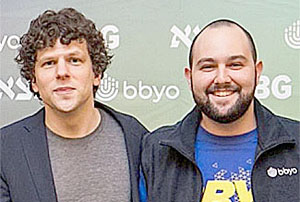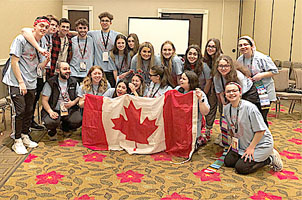Local News
19 members of BBYO Red River Region attend BBYO International Convention

By REBECA KUROPATWA
When Ian Baruch accepted the position of Youth Program Coordinator at the Rady JCC – in charge of BBYO, back in August 2019, he was excited to be leading a program in which he himself had been a member only a few years previously.
Born in Buenos Aires, Argentina, Baruch moved to Israel with his family as a baby, then seven years later to Winnipeg.
“I moved to Winnipeg and essentially grew up here,” said Baruch. “Since I moved here, I’ve been pretty involved in the Jewish community. From 2003 to 2019, I went to Camp Massad, either as a camper, counsellor, or, this past summer, as assistant director. I attended Gray Academy of Jewish Education all through elementary and high school. From Grades 9-12, I was part of BBYO here in Winnipeg and was in a chapter called ‘Alophim,’ so it feels like I’ve come full circle – which is a great feeling.”
While BBYO offers four conventions a year, three of them are local and the fourth is the international one. The Red River Region (essentially Winnipeg) has six chapters, three of which are for girls and three for boys, with some 130 teens registered, from Grades 9-12.
This year’s international convention took place in Dallas, TX from February 11th-17th.
“Every year, BBYO International puts on this international convention to bring together all the BBYO regions of the world, so they can share meaningful experiences with fellow Jewish young leaders,” said Baruch. “This year, we had over 5,000 people from over 50 different countries.”
As far as any effects felt on the convention due to the Corona virus, Baruch said, “When the convention was happening, there were only the flying restrictions of China into the U.S., so it was still pretty new. I’m sure if the convention were to be planned now, it would be much harder to actually execute it properly.
“This year, we had 19 people from the Red River Region (RRR) attend. Four of them were internationally recognized for their work in BBYO within RRR, and received awards.
“Another two of our members planned a program that the international boards of teens noticed. And they had them put on this program for other regions at the convention.”
The highlights for Baruch included meeting young leaders from the rest of the Jewish world and learning ideas and tips which he hopes to incorporate into his future programming.
The BBYO formal dance happened on March 7th at the Rady JCC, when BBYO members had a chance to come out with their (non-member) friends, dress up, dance, and have food.
From March 13th-15th, the RRR will host its final convention of the year, holding friendly competitions between the chapters that include, “Before I die, I want to _____.”
“Every year, the theme is in that style,” said Baruch. “They fill in the blank with what they want and make that their theme. They make it as serious or as foolish as they like, as long as it’s appropriate.”
Toward the end of the convention, time is spent on allowing the Grade 12 members to share about their time with BBYO. “This is also a good opportunity for the new members who have never attended this specific convention, to see what they have to look forward to and get an idea of programs that have been run over the years, and things of that nature,” said Baruch.
On March 22nd, the teens will participate in J-Serve, an international day of Jewish service. (Ed. note: As of the time of publication, this event will likely be canceled.)
This year, they will have a variety of stations set up at the Rady JCC with each station led by a BBYO team with an adult representative from various organizations. “For example, we’ll have a sandwich making station, a soup making station, a food sorting station, and more,” said Baruch. “It’s mostly geared to teens, but everyone is welcome.”
……..

BBYO member Adelle Bloom’s report on the convention
By ADELLE BLOOM
This year, I had the opportunity to attend one of the world’s biggest Jewish youth conventions: BBYO’s International Convention, commonly referred to as I.C. I met with over 3,000 delegates from around the world in Dallas, Texas, USA. The convention ran from February 12th to 17th. To say I was overwhelmed would be an understatement! There were teens from over 40 countries, including 19 people from Winnipeg, all meeting in one place. I met so many people from around the world and made friendships that would have never been possible otherwise. There were chances to go sightseeing, including, The Modern Art Museum of Fort Worth, The Dallas Aquarium, The Dallas Zoo, and so much more!
I got to hear so many amazing speakers, including Chris Ulmer, founder of “Special Books by Special Kids”‘ and David Dobrik, YouTuber and influencer. Ted Cruz, Senator of Texas, and Prime Minister Trudeau made video statements as well!
Jesse Eisenberg, award winning actor and playwright, talked about his Jewish upbringing, the role mental health plays in our lives, and his activism with domestic violence and sexual assault.
Bari Weiss, writer and editor for the New York Times, and author of How To Fight Anti-Semitism, talked about her experiences with anti-Semitism and growing up at the Tree of Life Synagogue in Pittsburgh. She mentioned some questions she had heard as she travelled across the world, speaking to Jewish communities, such as: “Who are we, why are we here, and what are we fighting for, and what is the Jewish future.”
But, the best part was actually seeing how we each come together, to make this community what it is today. It was truly an unforgettable experience, and I would recommend it to anyone looking for a place to make lifelong memories, and lifelong friends!
Local News
Thank you to the community from the Chesed Shel Emes

We’re delighted to share a major milestone in our Capital Campaign, “Building on our Tradition.” Launched in November 2018, this campaign aimed to replace our outdated facility with a modern space tailored to our unique needs. Our new building is designed with ritual at its core, featuring ample preparation space, Shomer space, and storage, creating a warm and welcoming environment for our community during times of need.
We’re grateful to the nearly 1,000 generous donors who contributed over $4 million towards our new facility. A $750,000 mortgage will be retired in November 2025, completing this monumental project in just seven years.
We’re also thrilled to announce that our Chesed Shel Emes Endowment Fund has grown tenfold, from $15,000 to $150,000, thanks to you, the Jewish Foundation of Manitoba’s FundMatch program, and Million Dollar Match initiative in 2024. Our fund helps ensure that everyone can have a dignified Jewish funeral regardless of financial need.
As we look to the future, our goal remains to ensure the Chevra Kadisha continues to serve our community for generations to come. Our focus now shifts to replenishing our savings account and growing our JFM Endowment fund.
We’re deeply grateful for your support over the past several years.
It’s our privilege to serve our community with care and compassion.
With sincere appreciation,
Campaign cabinet: Hillel Kravetsky, Gerry Pritchard, Stuart Pudavick,
Jack Solomon, and Rena Boroditsky
Murray S. Greenfield, President
Local News
Winnipeg Beach Synagogue about to celebrate 75th anniversary

By BERNIE BELLAN (July 13) In 1950 a group of cottage owners at Winnipeg Beach took it upon themselves to relocate a one-room schoolhouse that was in the Beausejour area to Winnipeg Beach where it became the beach synagogue at the corner of Hazel and Grove.
There it stayed until 1998 when it was moved to its current location at Camp Massad.
On August 2nd members of the synagogue will be holding a 75th anniversary celebration.

As part of the celebration anyone who is a descendant or relative of any of the original members of the first executive committee (as seen in the photo here) is invited to attend the synagogue that morning.
If you are a relative please contact Abe Borzykowski at wpgbeachshule@shaw.ca or aborzykowski@shaw.ca to let Abe know you might be attending or for more information about the 75th anniversary celebration.
We will soon be publishing a story about the history of the beach synagogue, which is something I’ve been writing about for over 25 years.
Local News
Vickar Family cuts ribbon on new Tova Vickar and Family Childcare Centre

By MYRON LOVE In the words of Larry Vickar, the Shaarey Zedek’s successful Dor V’ Dor Campaign “is not only a renewal of the synagogue but truly a renewal movement of Jewish life in our community.”An integral part of that renewal movement was the creation of a daycare centre within the expanded synagogue. On Monday, June 23, Larry and Tova Vickar cut the ribbon, thereby officially opening the Tova Vickar and Family Childcare Centre in the presence of 100 of their family members, friends and other supporters of the project.
The short program preceding the morning ribbon-cutting began with a continental breakfast followed by a welcome by both Fanny Levy, Shaarey Zedek’s Board President, and Executive Director Dr. Rena Secter Elbaze. In Elbaze’s remarks, she noted that Larry and Tova wanted their family (including son Stephen and family, who flew in from Florida) and friends at the event to celebrate the opening of the Tova Vickar and Family Childcare Centre, “not because of the accolades, but because, as Larry put it, he hopes that their investment in the congregation will inspire others to do the same.”
“When Larry and I spoke about what this gift meant to him and the message he wanted people to take away,” she continued, “I couldn’t help but connect it to the teachings of Reb Zalman Schachter-Shalomi whose book – Age-ing to Sage-ing – changes the whole way we look at the concept of ageing and basing it on our ancestral teachings.”
She explained that his concept of “Sage-ing” is based on three key ideas – Discover your meaning and purpose; accept our mortality and think about the legacy you want to leave.
“Larry spoke about these exact concepts when we met,” she said.
Elbaze also noted the presence of Shaarey Zedek’s newly-arrived senior Rabbi Carnie Rose, former Rabbi Alan Green, and area MLAs Mike Moroz and Carla Compton.
Larry Vickar expressed his great appreciation for all those in attendance. “Tova and I are deeply moved to stand here with you today for this important milestone in our community”, he said. “We are grateful to be surrounded by all of you, the people we care about, our family and friends… you who have touched our lives and played some part in our journey.”
